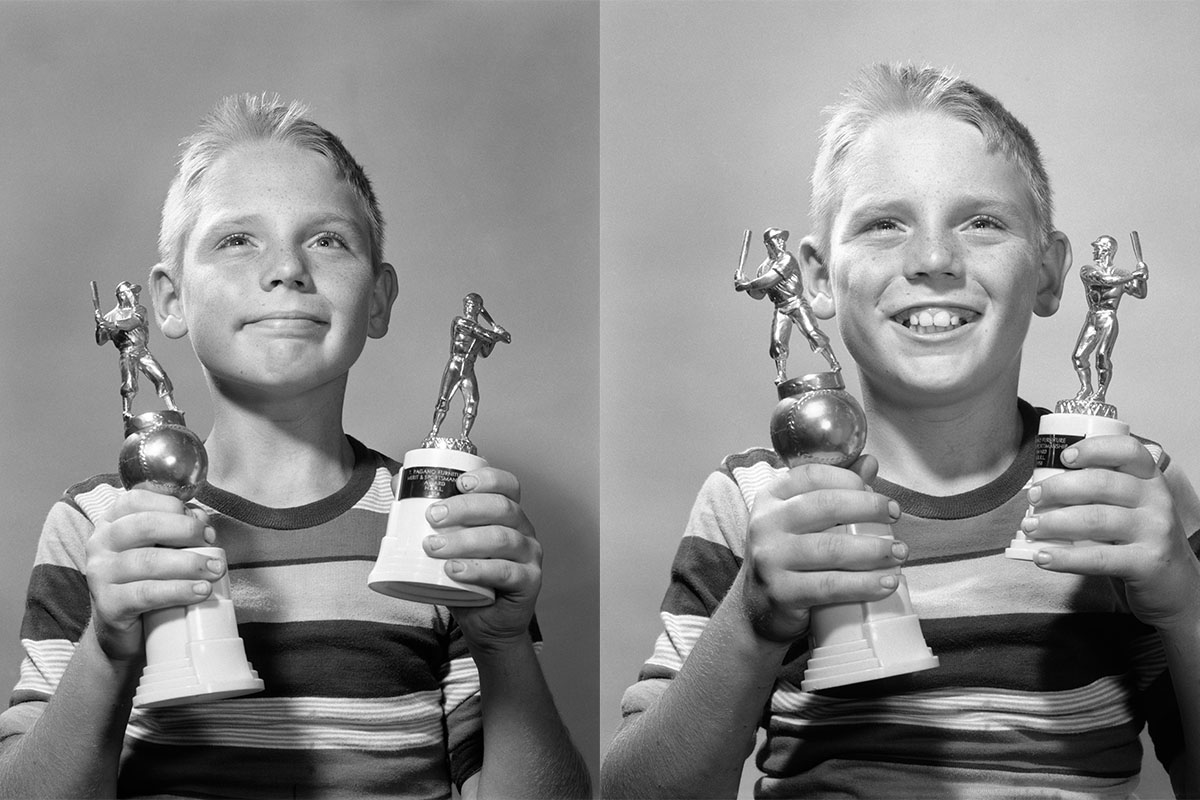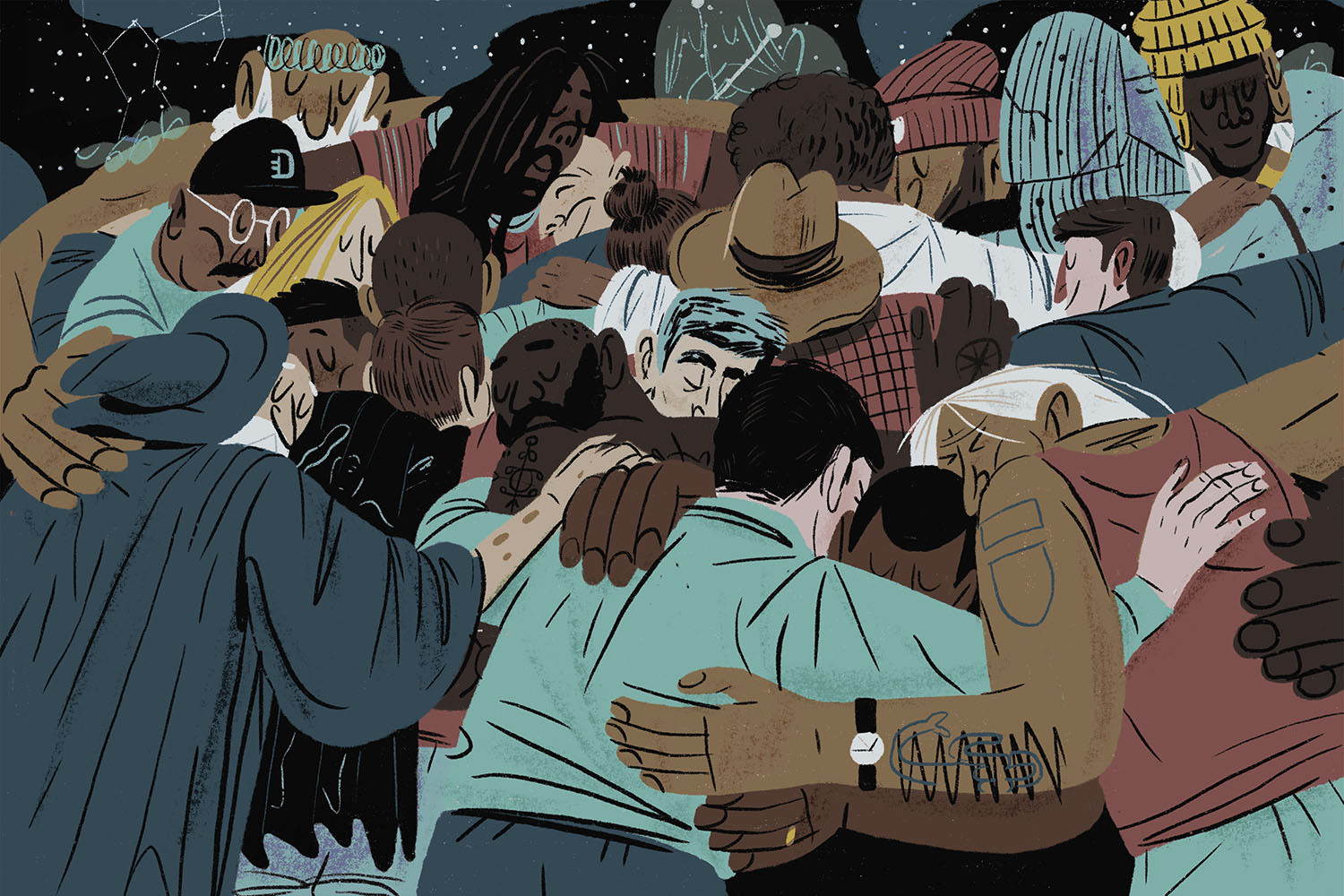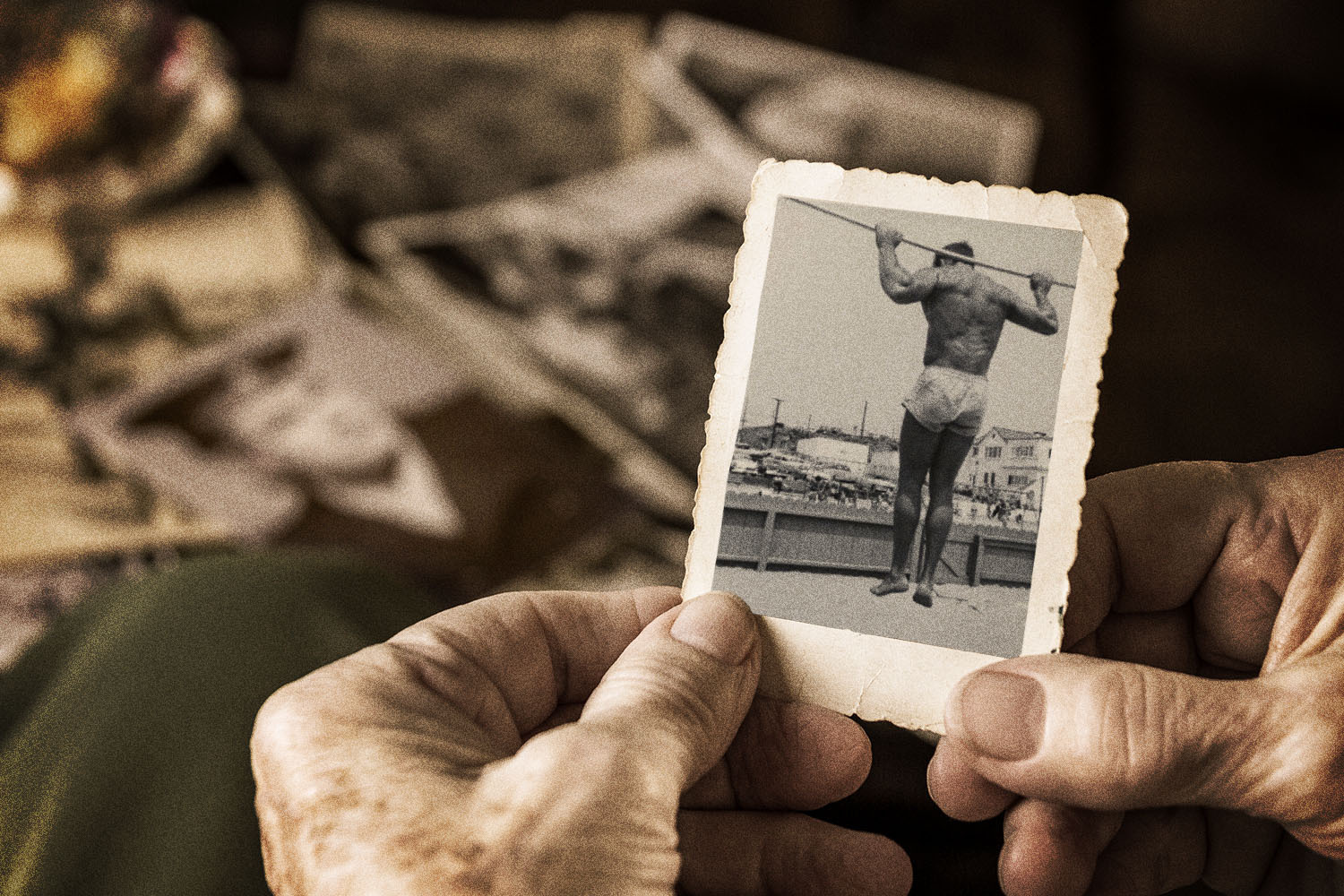In second grade little league, my team was the Chicago White Sox. It was the final year before the kids started pitching, and the dads — wearing giant versions of our uniforms — would stand about 40 feet from the plate and lob extra-soft baseballs into the strike zone. By the end of the spring, I was seven years old and batting .703. I remember that, because my little league coach had diligently scored every single play of every single game we played. After our last game, he brought out two boxes of Dunkin’ Donuts and gave everyone on the team trophies, each etched with a superlative, either statistical (like an impressive batting average) or subjective (a time someone made a diving catch in right field).
Similar to most mindlessly privileged suburban kids who came of age in early-2000s America, there was a shelf in my childhood bedroom that glinted gold, silver and bronze, with treasures from little league, summer basketball camps, fun runs, literature bowls and science fairs. On a cork board alongside it, I used to hang yellow-tasseled blue ribbons, red-and-white striped medals and pearl-embossed Certificates of Achievement. There was no conscious decision to create a shrine to myself — and I didn’t take care of it too well, it was dusty as hell — but the recognitions kept coming in, so I kept finding places for them. When I went on playdates to my friends’ homes, I would see identical arrangements, sometimes displayed in more public settings, like the living room or basement.
I grew up, you can probably surmise, in the era that spawned the “participation trophy” discourse: that generationally bound, nationwide dissensus on the pernicious effects of handing out hardware to undeserving grade schoolers. By the 2010s, when the first of the millennials were turning 30 and the first of Gen Z were turning 10, it had become culturally common for specific demographics — Baby Boomers, Gen Xers, clout-seeking millennials — to fume about the steady flow of awards that went to children at the turn of the century, linking such “honors” (through a political, economical or attitudinal lens) to the entitlement, laziness and general uselessness of the latest crop of Young People.
These days, the debate rages on, though the online community seems to have lost the thread. “Participation trophies” exists as pastiche, a strawman argument weaponized to call out anything that someone personally believes to be unearned.
For example: in just the last 24 hours, the University of North Carolina football team came under fire for awarding its players rings to commemorate their efforts in the 2020 season. One commenter called them “participation rings.” Elsewhere, WandaVision‘s success at the MTV Movie and TV Awards (of all things), drew the eloquent critiques of “rigged,” “circle jerk,” “participation trophies” and “no wonder shows are dying out.” It isn’t uncommon, either, to see a lonely participation-trophy-related tweet that doesn’t seem to have been prompted by anything in particular — the digital equivalent of a frustrated man opening his window and bellowing into the sky. “Participation trophies breed simps and socialists,” read one such recent diatribe.

How did we get here? And how seriously should we take the arguments underlying all this anger? The slow-burn virality of the term can’t be traced to a single incident, but there are telling episodes that helped light the fire. In 2015, Pittsburgh Steelers outside linebacker James Harrison made his children return a pair of trophies they brought home (they each received “2015 Best of the Batch Next Level Athletics Student-Athlete” awards) and took to Instagram, penning what might be seen as the Magna Carta of the no-participation-trophy philosophy:
“I came home to find out that my boys received two trophies for nothing, participation trophies! While I am very proud of my boys for everything they do and will encourage them till the day I die, these trophies will be given back until they EARN a real trophy. I’m sorry I’m not sorry for believing that everything in life should be earned and I’m not about to raise two boys to be men by making them believe that they are entitled to something just because they tried their best … cause sometimes your best is not enough, and that should drive you to want to do better … not cry and whine until somebody gives you something to shut u [sic] up and keep you happy.”
A few years earlier, The New York Times ran an op-ed entitled “Losing Is Good for You” that cited soccer leagues and summer programs where thousands of kids are guaranteed trophies. The trend, Ashley Merryman wrote at the time, was fueling a “$3 billion-a year trophy industry” and an idea that “in order to succeed, you just have to show up.” There’s also an article in Entrepreneuer citing the “Trophy-Industrial Complex” as the primary reason young American adults are less likely to start small businesses, plus a 2014 poll from libertarian magazine Reason, associating the “entitlement” of the 18- to 29-year-old cohort with their hypothetical approval of participation trophies.
The imagined universal truth that underlies almost every entry into the participation-trophy canon — op-ed, tweet, or otherwise — is that trophies are a recent phenomenon. That’s accompanied by the false supposition that “participation trophy” is a distinctly 21st-century entry into the lexicon. But it isn’t. Far from it. The first recorded use of the phrase turns 100 next February. In winter of 1922, a clipping in an Ohio newspaper, the Evening Independent, reported on the awards being handed out at a high school basketball tournament. The correspondent wrote: “Members of the victorious outfits will be given individual trophies. A participation trophy also will be given to each athlete playing in the series.”
Those kids would’ve been born somewhere between 1905 and 1908. They grew up through World War I, the Spanish Influenza and Roaring Twenties, came of age during the Great Depression and served as older G.I.s in World War Two. In other words: they were Tom Brokaw’s “Greatest Generation.” The practice of giving out trophies just because then continued for decades, as Slate outlined in a detailed history of the trophy tradition. It wasn’t ubiquitous, to be fair — trophies weren’t mass-produced and sold in sporting goods stores until the 1960s — but it was there.
That knowledge, plus a common-sense smell test (if you’re over the age of 50, can you say without a shadow of a doubt, that every trophy you ever received was for finishing top three in a contest?), suggests that “participation trophies” are a manufactured national woe — more so an opportunity to dunk on a younger generation than a cogent conversation-starter on how to help children succeed. Generational theory has long commented on the clumsiness that arises when different cohorts have to share the same evolving country. This clumsiness can easily lead to misunderstandings, and sometimes, cruelty. As sociologist Amanda Grenier pointed out in a 2007 essay: “Different ways of speaking exercised by older and younger people exist, and may be partially explained by social historical reference points, culturally determined experiences, and individual interpretations.”
Simply put, people from different times process things differently. And almost to a tee, older people always find wrongs with how younger people conduct themselves. “Kids these days” is a perpetual sentiment; as Vox recently wrote, the same kids incanting “OK, boomer” today will likely one day complain about the narcissism, sloth and incompetency of whatever generation comes of age in the 2050s. No generation should ever have to list its collective traumas to prove its worth, but those that Millennials and Gen Z have experienced are alarming: terrorist attacks, school shootings, extreme natural disasters, social media-related suicides, a once-in-a-century pandemic, meteoric college costs, rent increases, wage stagnation.
It’s temping to completely disregard the participation trophies argument and particularly the ways in which it tries to sum up the actions and attitudes of millions of people (many of whom are now in their 40s, with children of their own). Some have even be tempted in the other direction, and spend their days preemptively hurling the phrase back at politicians or pundits who they imagine subscribe to the theory: “Here’s a message to people who get angry about participation trophies.” But a more useful way forward is to simply highlight the psychological benefits of giving out awards. There is no scientific consensus yet, but there are researchers well-versed in the subject who believe that these trophies hold merit. And there and ways in which the award-givers (parents, coaches and teachers) can tinker with the process to make sure that the receiving children feel seen, appreciated and actually motivated to keep working at whatever the activity may be.

According to Nick Bognar, a Pasadena-based marriage and family therapist, we should embrace participation trophies. “They’re a lovely and appropriate way to commemorate any event where participation matters and requires work,” he says, “which is certainly true of children’s sports. Little kids need to feel a sense of accomplishment, and participating in sports is an accomplishment; it takes teamwork, practice, diligence and all kinds of other things we want kids to learn.”
This line of thinking, which is so often forgotten, is a reminder that participating — “showing up,” as the trophies’ biggest critics like to say — is no small thing. Showing up involves meeting one’s peers for the first time (remember how nerve-wracking that could be?), developing relationships, keeping a consistent schedule and, in a team setting especially, assuming different responsibilities over the course of a season. This breeds a sense of belonging and community. It’s social immersion, in an extremely traditional sense, and a logistical counter to another habit that older folks are generally critical of in younger generations: too much time spent indoors, wasted on phones and video games.
Shouldn’t we encourage this sort of behavior? Don’t we want children to associate positive feelings with experiences where they put themselves out there? It’s typical for dissenters to invoke the “real world” — a boogeyman waiting to pounce on all these severely underprepared youths — and they usually do so in an overtly capitalistic sense. Learn how to take your lumps now, so you won’t walk around whining as an adult. But this assumes sports teams and science fairs are the sum totality of childhood, as if kids can’t absorb lessons from their parents, have no clue what it feels like to win or lose in the classroom, or aren’t accustomed to the pangs of exclusion and inferiority that can arrive in the lunchroom or on the playground. Consider: in most states throughout the country, standardized testing starts at age seven. Meritocracy and social hierarchy are reinforced early, in a million different ways. The opposite of “toughening” kids up isn’t coddling. It’s letting those precious years last as long as they can, until those sobering realities — this I can do, this I cannot — crystallize.
Bognar points out that participation trophies can function as effective totems during that brief period of time when stakes are actually low and socializing takes precedence over competition. “They serve as terrific mementos for what is (hopefully) a really fun and important part of a kid’s life,” he says.
The ultimate key? Making sure those mementos mean something. It doesn’t take much effort, from a coach, camp counselor or teacher, to attach individualized significance to each hunk of plastic. Part of the reason participation trophies can have so little meaning, ironically enough, is that people have hijacked the phrase and turned it into a negative. The more you call it a participation trophy, the less a a kid may want or respect it. It’s not enough to finish 47th in a middle school’s mile run, apparently. You may as well have never showed up to the starting line. But adults know there is excellence in merely finishing a race. Consider the millions of adults each year who wobble away from marathons with medals and a goodie bag full of branded swag. The “trophies” don’t end there, either — every like and comment from friends on the following day’s inevitable Instagram post is recognition for “participation.”
Effort needs to matter just as much as achievement. When handing a kid a trophy, you’re allowed to tell him or her why they’re getting it. In fact, you really should. Grant Aldrich, the founder of an online education platform, says, “Kids don’t know how to celebrate small wins as adults do. Participation trophies help them celebrate their efforts, even when they didn’t win. This helps them develop a growth mindset, which means they won’t fear failure as they grow up.” According to Aldrich, “It’s beneficial to praise efforts, not achievements. Praising achievements can cause kids to tie their self-worth to their performance, which can be toxic. Participation trophies also contribute to a child’s positive self-image, even if they’re not the best or most talented.”
Is there any rational argument against participation trophies, then? Rebekah Silver, a community psychologist, cautions that when children wise up to a poorly conceived trophy handout, it can ruin their confidence over time. “The tendency is to wind up with a complex where one feels as though they don’t deserve anything at all, even when they’ve worked for it.” Interestingly, this is the opposite result to what what online trolls might have you believe — when doled out willy-nilly, awards don’t make kids feel entitled. They make them feel inadequate. This, more than anything, is the argument for organized competition and “earned” honors by the time they’re 10 or 12. The stakes become necessary and helpful at some point — they just don’t need to be phased in when kids are still struggling to double-loop their shoelaces.
The only “trophies” I still have are: A) a plaque from high school, honoring a season of cross country where I led my team to a second-place finish in the county, and B) an excellence in writing award from a semester abroad in Denmark. The dozens of other accolades didn’t survive years of spring cleanings. This is typical: as we age and come to know ourselves, we want to be recognized for those things we know we excel in. But young kids don’t know who they are, and they don’t know what they want. And even the most indifferent kid on the team isn’t moping through Sunday morning soccer practices just so he can get a golden figurine in two months. He’s learning something about himself. That’s a good thing. A decade later he might be volunteering at animal shelter on Sunday mornings instead, training to become a veterinarian.
Children deserve our love, support, patience and, yes, our trophies. It’s funny — one of the weakest things you can do in the modern age is cower behind a screen and put down people you’ll never meet. What an odd coincidence, that so many of these people proudly claim to have never received a participation trophy.
Whether you’re looking to get into shape, or just get out of a funk, The Charge has got you covered. Sign up for our new wellness newsletter today.
























